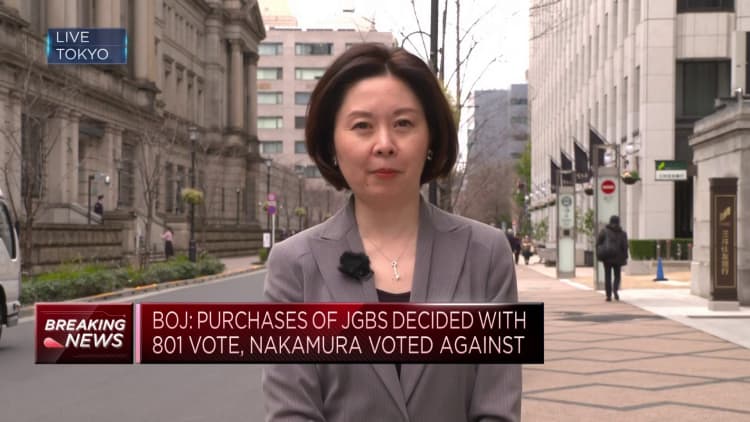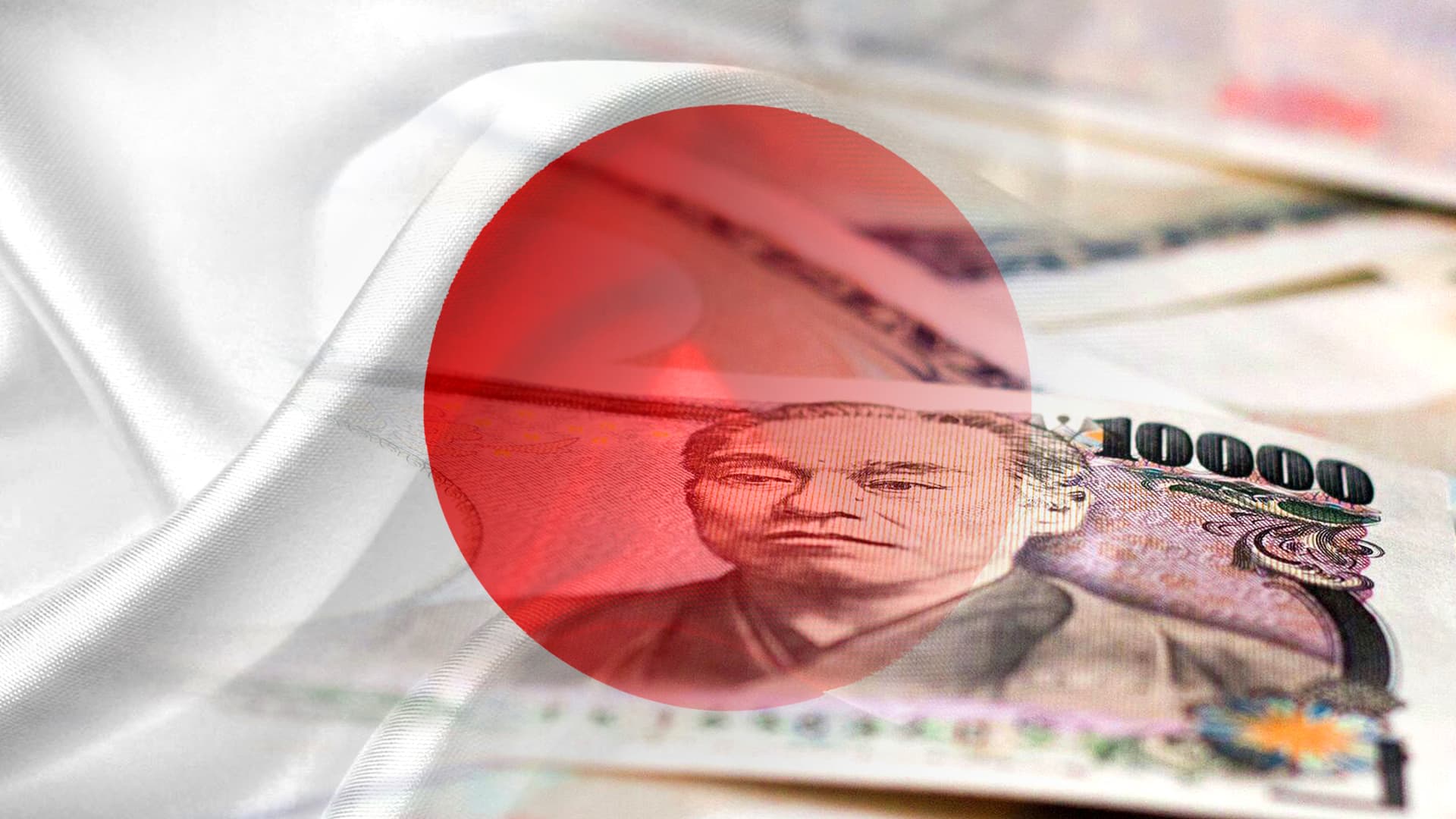An editorial montage of the Japan flag and Japanese yen cash bank notes
Javier Ghersi | Moment | Getty Images
Japan’s central bank raised interest rates on Tuesday for the first time since 2007, ending the world’s only negative rates regime and other unconventional policy easing measures enacted over the course of the last few decades to combat deflation.
These changes mark a historic shift and represent the sharpest pull back in one of the most aggressive monetary easing exercises in the world, which was aimed at reflating prices in the Japanese economy. The BOJ’s actions also precede the U.S. Federal Reserve’s interest rate decision later this week.
“The likelihood of inflation stably achieving our target has been heightening … the likelihood reached a certain threshold that resulted in today’s decision,” BOJ Governor Kazuo Ueda said at a press conference after the central bank’s decision, according to a translation provided by Reuters.
The Bank of Japan though cautioned it’s not about to embark on aggressive rate hikes, saying that it “anticipates that accommodative financial conditions will be maintained for the time being,” given the fragile growth in the world’s fourth-largest economy.
“If the likelihood heightens further and trend inflation accelerates a bit more, that will lead to a further increase in short-term rates,” Ueda said. He added though there is still “some distance for inflation expectations to reach 2%.”
The BOJ raised its short-term interest rates to around 0% to 0.1% from -0.1% at the end of its two-day March policy meeting. Japan’s negative rates regime had been in place since 2016.
It also abolished its radical yield curve control policy for Japanese sovereign bonds, which the central bank has employed to target longer-term interest rates by buying and selling bonds as necessary.
The central bank though will continue purchasing government bonds worth “broadly the same amount” as before — currently about 6 trillion yen per month.
It would resort to “nimble responses” in the form of increased JGB purchases and fixed-rate purchases of JGBs, among other things, if there is a rapid rise in long-term interest rates.
Scaling back its asset purchases and quantitative easing, the BOJ said it would stop buying exchange-traded funds and Japan real estate investment trusts (J-REITS). It also pledged to slowly reduce its purchases of commercial paper and corporate bonds, with the aim of stopping this practice in about a year.
“As for the future, we will at some point eye shrinking our balance sheet given we’ve ended our extraordinary monetary easing. But we can’t specify now when that will happen,” Ueda told reporters.
He described the BOJ’s JGB and ETF holdings as “remnants of the extraordinary monetary easing scheme,” while deferring questions on the impact of the central banks’ unorthodox policies until an ongoing review is completed.
Yen weakens, yields slip
The yen weakened sharply to beyond 150 to the dollar — a level that’s previously prompted intervention from Japanese authorities.
Yields on the 10-year Japanese government bonds slipped, while the Nikkei stock index ended slightly up in a volatile session after the rate decision and ahead of a public holiday in Japan.
“As always, I won’t comment on short-term currency moves,” Ueda said at the press conference. “But if currency moves have a big impact on our economic and price forecasts, we will stand ready to take an appropriate monetary policy response.”

Financial markets had repositioned over the past week as local Japanese news reports and preliminary wage negotiation results fanned speculation that the BOJ could normalize rates a month earlier, ahead of its April meeting.
Ongoing “shunto” spring wage negotiations between Japan Inc and its unionized workers have so far yielded a weighted average 3.7% spike in base pay, Rengo, Japan’s largest federation of trade unions said Friday in its first provisional update.
This is even more robust than last year’s gains, which were the steepest spike in three decades.
Inflation target
The BOJ had barely budged from its ultra-loose monetary policy posture despite “core core inflation” — which excludes food and energy prices — exceeding its 2% target for more than a year, as policymakers viewed price increases were largely imported.
BOJ Governor Kazuo Ueda had repeatedly said the outcome of this year’s annual “shunto” wage negotiations would be key to sustainable price increases. The Bank of Japan expects higher salaries to lead to a virtuous spiral with domestic demand fueling inflation.
“Services prices have continued to increase moderately, partly due to the moderate wage increases seen thus far,” the BOJ said in a statement.
“As these recent data and anecdotal information have gradually shown that the virtuous cycle between wages and prices has become more solid, the Bank judged it came in sight that the prices stability target would be achieved in a sustainable and stable manner toward the end of the projection period of the January 2024 outlook report,” it added.
Uncertain outlook
With inflation slowing and an economy that barely averted a technical recession toward the end of last year, Ueda flagged some possible headwinds.
“There are numerous risks surrounding the global economy such as the chance of a negative market shock. There’s also the risk that consumption may not recover as much as expected,” he said.
High inflation has crimped domestic demand and private consumption. Private consumption fell 0.3% in the fourth quarter from the previous one — more than the provisional estimates of a 0.2% decline.
“If our price forecast clearly overshoots or, even if our median forecast is unchanged, we see a clear increase in upside risk to the price outlook, that will likely lead to a policy change,” Ueda said.
Investors and market watchers may have to wait for the BOJ to update its economic forecast at its April meeting, where the central bank is expected to release its 2026 forecast.
“Japan’s expectation of inflation, when looking at a timespan of 5 to 10 years, is likely somewhere around 1-1.5% … At present, real interest rate is likely deeply in negative territory. Unless the neutral, real rate of interest is very deeply in negative territory, we can say Japan’s monetary condition is accommodative,” he said.

